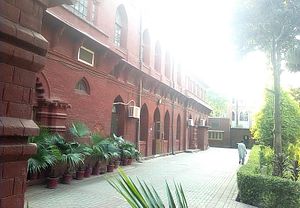Last week, scores of students were injured at the University of Punjab (PU) Lahore campus when the Islami Jamiat Taleba (IJT), the student wing of Jamaat-e-Islami (JI), assaulted a Pashtun cultural event at the campus.
The PU in Lahore and the Quaid-e-Azam University in Islamabad are among the country’s most noted public universities. Both universities have been an IJT stronghold since 1970s. In Pakistan, the IJT’s presence on public university’s campuses is largely known for the student union’s self appointed role as a “moral police” force. Over the last four decades, the IJT has aggressively used violence on university campuses to ensure that the educational institutes in the country adhere to conservative Islamic principles which according to IJT and its parent political party means the eradication of western liberal values from Pakistan.
The student wing of the JI was formed soon after the country’s inception. The group was largely created in an effort to counter rival left-wing student organizations in universities across Pakistan. Moreover, the creation of the group was also in part an effort by right-wing conservative elites to steer the country away from its founding father’s mission of transformation into a liberal, secular, and tolerant state.
However, it is only in the early 1970s that the IJT became a force to be reckoned with in Pakistan’s campus politics. This came about largely as a result of the return of young veterans of the Bangladesh civil war in 1971 who had joined the al-Badr and al-Shams Islamist groups of the JI in East Pakistan.
In the late 1970s, General Zia-ul-Haq toppled Zulfikar Ali Bhutto’s civilian government. Shorty after coming to power, Zia made the Islamization of Pakistan the official policy of his government. In his drive to purge the country of “westernization,” the liberal and highly progressive environment of Pakistan’s public universities became one of the Zia’s first victims.
The Sunni Deobandi Ulama, including the JI’s leadership, were given unexpected and powerful roles in various state institutions. During the years Zia was in charge, the state-led policy of patronizing the country’s conservative factions resulted in the rapid rise of extreme right-wing political and religious student unions and their armed cadres on campuses across Pakistan.
During the war against the Soviet Union in Afghanistan, public universities in Pakistan, along with madrassas, proved an effective tool for the recruitment of fighters. As a consequence of the Afghan Jihad, weapons started to appear on university campuses in Pakistan. The availability of and easy access to firearms on campuses was tolerated by the Zia regime largely due to political reasons, associated with the president’s efforts to reduce Bhutto’s support on university campuses that mostly stemmed from left-wing student unions.
Additionally, it was also during president Zia’s rule that the Islamization of student politics in public universities created sectarian divisions far beyond the margins of religious seminaries. Arguably, sectarian militancy first emerged in Pakistan’s public universities when the Deobandi student unions, led by the IJT, resorted to violent means to achieve their objectives in universities across Pakistan. The “sectarianization” of education at campuses was tolerated, if not encouraged, by Zia’s military regime. This in result created internal chaos in the form of sectarian scuffles at educational institutes in the country. Sunni and Shia factions of different students unions supported and funded by Saudi Arabia and Iran respectively, bounced into existence.
Historically, the JI has been in the forefront of resurgent Islam, largely known for its anti-Western fundamentalist rhetoric in Pakistan. Unlike other “politico-religious” parties in the country, most of the JI’s support base comes from its presence at universities through its student unions. The IJT’s role in this regard has been central: the JI’s relevancy in the country’s political arena has largely been due to the street power of IJT, which continues to ensure, if not broad, at least the marginal electoral strength of JI at the polls.
The IJT’s conservative ideological outlook, which was adopted from its parent organization, has been a force of radicalization in itself. Recently, the country’s intelligence agencies, in an operation in PU, arrested at least nine al-Qaeda-affiliated militants, who were allegedly hiding in the university’s student hostels controlled by the IJT.
The Pakistani government needs to take adequate measures to ensure that educational institutes across the country remain a place of knowledge and scholarship, where ideas are explored through debate and dialogue rather than through violence and bullying. The environment of lawlessness which the IJT has created on public university campuses across Pakistan needs to be deposed.

































